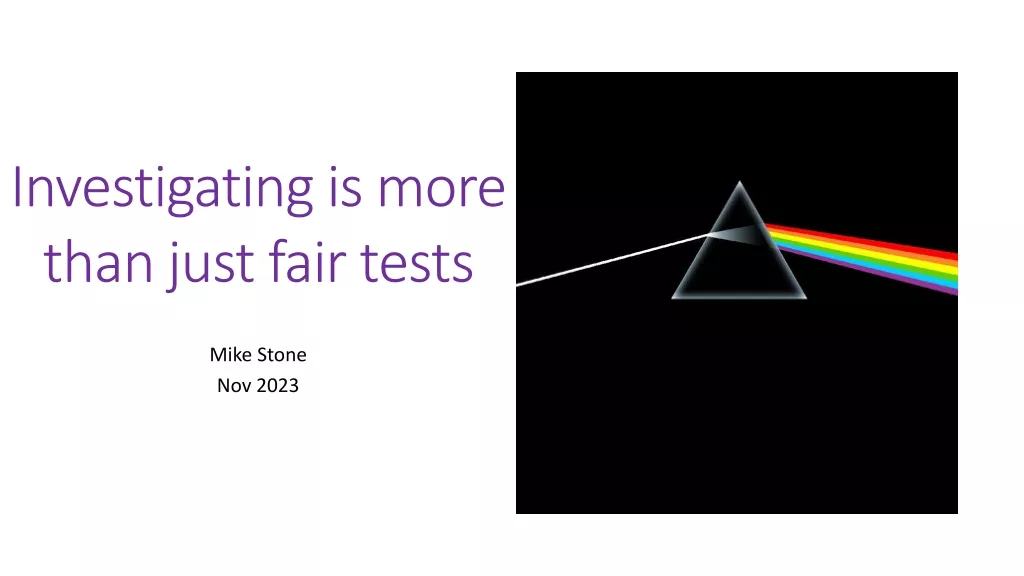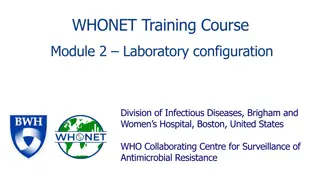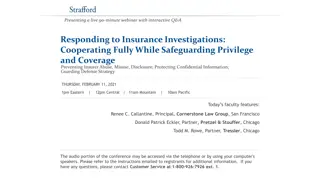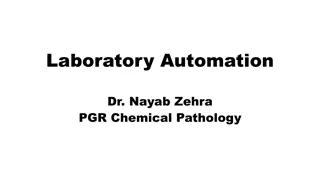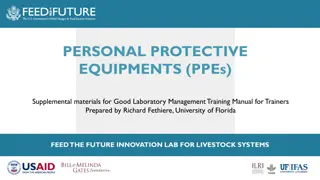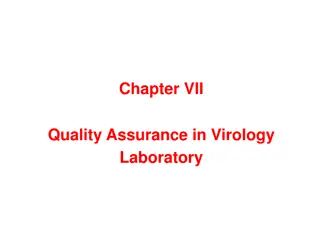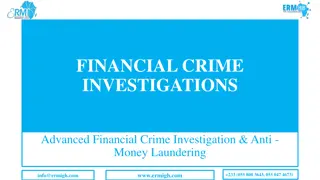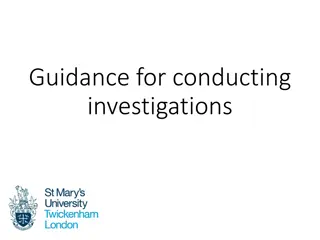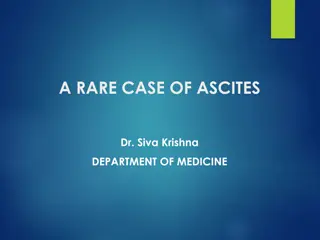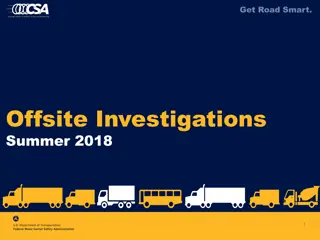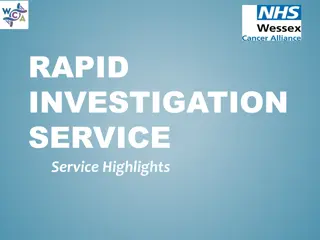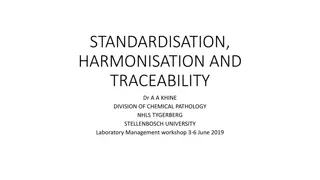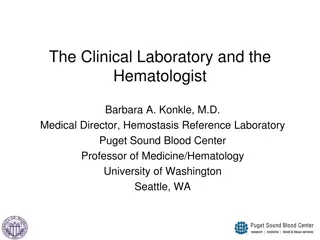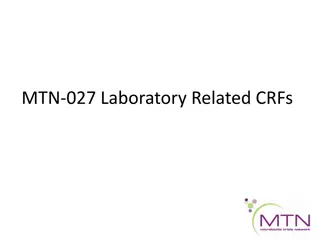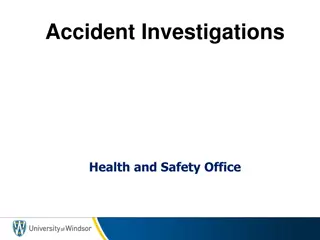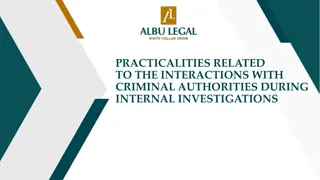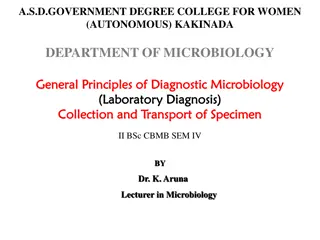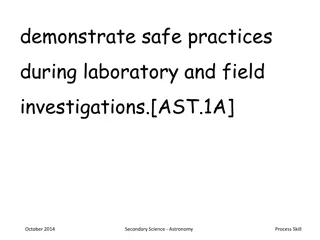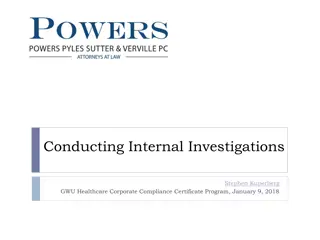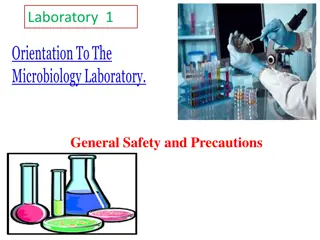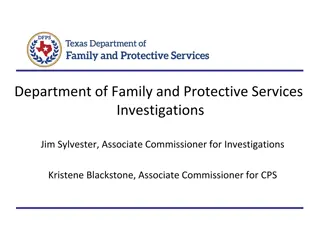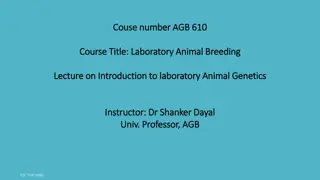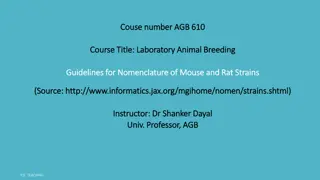History and Educational Programs of DEU Lab Animal Science Department
Established in 2004, the Department of Laboratory Animal Science at Dokuz Eylul University Institute of Health Sciences offers cutting-edge education focusing on animal welfare and ethical practices in scientific research. The department upholds the 3R Principle—Reduction, Refinement, Replacement�
0 views • 9 slides
Investigations in Science
Investigating in science involves various approaches beyond fair tests, such as pattern-seeking, exploring, and modeling. Not all scientists rely on fair tests, as observational methods are also commonly used. The scientific method consists of steps like stating the aim, observing, forming hypothese
1 views • 20 slides
Laboratory Material Quality Management Procedures
This detailed guide covers the comprehensive process management and quality control procedures for laboratory materials, including the life cycle of materials, purchase processes, vendor evaluation, reception and storage guidelines, and evaluation criteria. It emphasizes the importance of documented
1 views • 20 slides
Effective Laboratory Management: Safety, Equipment Maintenance, and Inventory Control
This comprehensive training manual covers essential topics such as laboratory safety, equipment maintenance, supplies and reagents inventory, chemical inventory management, and material safety data sheets. It emphasizes the importance of proper procedures to ensure a safe working environment and eff
2 views • 19 slides
Optimizing Laboratory Billing Services, The Key to Efficient Healthcare Revenue Management
In the intricate web of healthcare management, laboratory billing services play a pivotal role. From accurately documenting procedures to ensuring compliance with complex insurance regulations, effective billing is essential for the financial health of laboratories and the overall healthcare system.
2 views • 8 slides
WHONET Training Course: Laboratory Configuration and Setup
Understanding the laboratory configuration process in WHONET is crucial for effective data entry and analysis. This module guides users on setting up a new laboratory, entering country and lab details, defining antibiotics, sample locations, and data fields, creating microbiological alerts, and savi
3 views • 57 slides
Streamlining Laboratory Billing Services, Key Benefits and Best Practices
In the fast-paced environment of medical laboratories, accurate and efficient billing processes are essential. Laboratory billing services are crucial in ensuring financial stability and compliance with healthcare regulations. This blog explores the benefits of professional laboratory billing servic
1 views • 7 slides
Enhancing Laboratory Billing Services with MedKarma, A Comprehensive Guide
In the dynamic healthcare landscape, laboratory billing services play a crucial role in ensuring smooth financial operations for medical laboratories. Effective billing practices not only streamline revenue cycles but also enhance overall operational efficiency. MedKarma, a leading provider of labor
4 views • 7 slides
Revolutionizing Laboratory Billing Services with Medkarma, Precision, Efficiency, and Transparency
In the ever-evolving healthcare landscape, laboratory billing services stand as a critical component in ensuring the financial health of diagnostic labs. The complexity of billing processes, coupled with stringent compliance requirements, demands a specialized approach. Medkarma, a leader in healthc
2 views • 7 slides
Insurance Investigations: Handling Privilege, Coverage, and Disclosure
Explore the nuances of responding to insurance investigations in this 90-minute interactive webinar. Learn how to cooperate effectively while protecting privilege, coverage, and confidential information. Gain valuable insights on preventing insurer abuse, misuse, and disclosure, as well as safeguard
0 views • 52 slides
Environmental Investigations Unit of Houston Police Department
Environmental Investigations Unit of the Houston Police Department is responsible for investigating crimes with environmental impact in the city, such as water pollution, hazardous waste dumping, air pollution, and illegal dumping. They work on large-scale investigations involving releases of hazard
0 views • 6 slides
Environmental Investigations Unit of Houston Police Department
The Environmental Investigations Unit of the Houston Police Department is responsible for investigating crimes with an environmental connection in the city. From water pollution to hazardous waste dumping, the unit handles a wide range of cases, focusing on criminal investigations and coordinating s
0 views • 6 slides
Laboratory Automation in Chemical Pathology: A Comprehensive Overview
Laboratory automation in chemical pathology involves the use of control systems to minimize human intervention and improve efficiency in conducting tests. The historical background, types of automation, benefits, total laboratory automation, and important considerations are discussed in detail.
3 views • 25 slides
Best Practices for Laboratory Safety and Management
Promoting a safe laboratory environment involves following safety codes and assigning responsibilities for practices like hazard awareness, equipment use, and PPE. Good laboratory practices include proper storage and handling of hazardous chemicals, with a focus on flammable, corrosive, reactive, an
4 views • 17 slides
Quality Assurance in Virology Laboratory
This chapter focuses on quality assurance in virology laboratory, covering topics such as quality control, documentation of test results, laboratory safety rules, and more. It explains the types of quality control, quality assurance cycle, and process areas of quality assurance in laboratory testing
3 views • 19 slides
Child Placing Agencies and Child Caring Institutions Overview
Explore the procedures and protocols followed by Special Investigations and Regular Investigations units when dealing with allegations of maltreatment in Child Placing Agencies (CPA) and Child Caring Institutions (CCI). Learn about the different types of investigations and how cases are handled base
1 views • 16 slides
Advanced Financial Crime Investigations and Anti-Money Laundering Overview
Explore the world of advanced financial crime investigations, anti-money laundering, and the importance of estimating financial reporting errors. Delve into the role of internal audit and investigations, understand the significance of changes in accounting estimates, and learn why estimation is vita
1 views • 63 slides
Best Practices for Conducting Effective Investigations
Understanding the purpose, principles, and process of investigations is crucial for conducting fair and well-managed inquiries. Learn about the impact of improper investigations and follow a structured approach encompassing appointment of an investigating manager, defining scope, planning, evidence
1 views • 41 slides
A Rare Case of Ascites in a 22-Year-Old Female: Clinical Presentation and Investigations
A 22-year-old female presented with abdominal distension and pain. Her medical history, family history, and personal habits were reviewed. Examination revealed mild hepatomegaly and shifting dullness. Lab investigations showed normal values with no signs of infection. Ascitic fluid analysis indicate
1 views • 20 slides
Offsite Investigations in CSA's National Safety Interventions
Offsite Investigations are part of CSA's safety tools, conducted remotely to ensure carrier compliance. Safety Investigators review online documents to diagnose issues and provide corrective actions. Failure to comply may result in penalties or onsite investigations. Offsite Investigations have show
1 views • 7 slides
Geometry Investigations and Theorems
Explore various circle theorems and investigations involving angles, tangents, radii, and circumferences. Discover the relationships between angles at the center and circumference, the properties of tangents, and the angle measurements within a circle. Engage in investigations to understand the sign
7 views • 26 slides
Rapid Investigation Service Overview
The Wessex RIS is a new cancer referral pathway aimed at patients with concerning non-specific symptoms. Working in partnership with acute trusts in Wessex, the service provides timely investigations to exclude cancer in such patients. Established as part of the National Rapid Diagnostic Centre proj
0 views • 15 slides
Achieving Comparable Results in Laboratory Practice
Good laboratory practice necessitates minimal error in measurement to reflect a patient's biological condition accurately, ensuring comparable and reliable results regardless of testing location or method. Standardization, harmonization, and traceability play crucial roles in achieving uniformity an
1 views • 29 slides
Enhancing Laboratory Science Education for S5/6 Pupils
Addressing the gap in the curriculum, this initiative offers practical and accredited courses in laboratory science to better engage S5/6 pupils. With a focus on developing transferable skills, the program aims to improve employment potential and awareness of career opportunities in laboratories. Th
0 views • 10 slides
Insights into Hematology Laboratory Practice
This resource explores the potential role of hematologists in laboratory settings, discussing board certification, advantages, challenges, current training trends, and core curriculum lectures in hematology. It sheds light on the critical areas of laboratory training, emphasizing the importance of u
0 views • 9 slides
Laboratory Related CRFs for Pharmacokinetics Study
This collection encompasses various CRFs related to laboratory procedures in the context of Pharmacokinetics for a study. It includes forms for enrollment, specimen storage, safety laboratory results, and specific days for sample collection. The CRFs detail the storage, collection, and documentation
1 views • 14 slides
Effective Accident Investigations for Safety in the Workplace
Understanding the importance of accident investigations and their objectives is crucial for workplace safety. This content covers the definition of accidents, accident investigation objectives, the purpose behind investigations, and who typically conducts them. It emphasizes the need for thorough in
0 views • 34 slides
Practical Considerations for Interacting with Criminal Authorities During Internal Investigations
This content discusses the legal obligations and privacy issues involved when interacting with criminal authorities during internal investigations. It covers topics such as revealing information, privacy concerns with devices, documenting investigations, and standard procedures for requesting inform
0 views • 12 slides
Collection and Transport of Specimens in Diagnostic Microbiology
Successful laboratory investigations depend on the proper collection and transport of specimens. This involves selecting adequate samples that represent the diseased area, avoiding contamination, obtaining specimens before administering antimicrobials, ensuring biosafety, proper documentation, and t
0 views • 20 slides
Best Practices in Laboratory and Field Investigations for Secondary Science - Astronomy
This content covers various aspects of safe practices in laboratory and field investigations related to secondary science - Astronomy. It includes information on resource conservation, disposal/recycling of materials, understanding the limitations of science, scientific hypotheses, theories, disting
0 views • 16 slides
Direct Payments & Social Care Investigations Workshop Overview
Explore the key areas covered in the Direct Payments & Social Care Investigations Workshop, focusing on Direct Payments, social care fraud, applications, counter-fraud work, investigations, and overcoming cultural resistance. Delve into the risks associated with social care fraud and learn about the
1 views • 28 slides
Internal Investigations in Corporate Compliance
Understanding the importance of conducting internal investigations in corporate compliance is crucial to address potential misconduct, comply with regulations, and prevent legal implications. This article explores the reasons, methods, and benefits of internal investigations within organizations.
0 views • 33 slides
Laboratory General Safety and Precautions
Microbiology involves the study of microorganisms such as bacteria, fungi, viruses, and parasites. It is crucial to maintain strict safety protocols in the laboratory to prevent contamination and ensure the well-being of individuals handling these potentially pathogenic organisms. Rules like wearing
0 views • 26 slides
Internal Investigations in Corporate Compliance
An internal investigation in corporate compliance involves probing suspected misconduct within an organization. It is a crucial element of compliance programs, aimed at uncovering facts, halting violations, implementing remedies, and considering disciplinary actions or self-disclosure to authorities
0 views • 26 slides
Strategies for Creating Mathematical Investigations with CAS Technology
In this workshop, participants will learn strategies for developing structured and open-ended mathematical investigations with the support of CAS (Computer Algebra System) technology. The session will focus on breaking down big ideas into components, drafting tasks effectively, creating open-ended q
0 views • 12 slides
Overview of Department of Family and Protective Services Investigations
The Department of Family and Protective Services (DFPS) Investigations Division was established in 2017 as part of DFPS becoming an independent agency. The division incorporates investigative functions from various departments to focus on ensuring the safety, permanency, and well-being of children a
0 views • 16 slides
Laboratory Animal Genetics and Research Importance
This course (AGB 610) delves into the realm of laboratory animal breeding, exploring the significance of using animals in research and teaching. Dr Shanker Dayal, a distinguished professor, guides students through lectures on animal genetics and the common uses of laboratory animals. The course emph
1 views • 14 slides
Walk Through Series 1: Expectations & Investigations for Title IX Team Members
This walk-through series provides guidance for advisors on their roles, responsibilities, and expectations when supporting students, faculty, and staff involved in Title IX investigations. It covers important topics such as advisor violations, maintaining privacy, intake meetings, investigations, an
0 views • 9 slides
Exploring the Role and Objectives of Laboratory Teaching
The content delves into the various perspectives on laboratory teaching, its aims, pedagogical levels, and common challenges faced. It discusses specific aims of laboratory teaching, including familiarization with equipment, teaching experimental work attitudes, and training in observation and deduc
1 views • 32 slides
Guidelines for Nomenclature of Laboratory Mouse and Rat Strains
Laboratory mice and rat strains have specific nomenclature guidelines to account for their genetic backgrounds and origins. Mouse strains are registered through the Mouse Genome Database, while rat strains are registered through the Rat Genome Database. The use of Laboratory Registration Codes is cr
0 views • 14 slides

